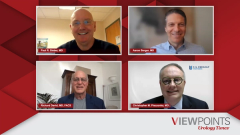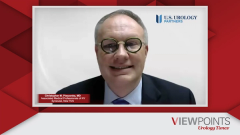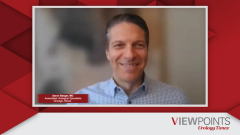
Specialized Training and Education of Care Providers in Prostate Cancer
Focused discussion on the quality of training and onboarding of physicians who manage advanced prostate cancer within a variety of institutions and settings.
Episodes in this series

Transcript:
Paul R. Sieber, MD: Talking about advanced prostate cancer, I think it’s ... interesting that all of us are community urologists who basically are all specialized in what we do. And I know how I got there was basically through clinical trials and the fact that my practice these days is 90% prostate cancer with a smattering of bladder and just a minimal amount of general urology anymore. And Richard, how did you get to where you are in your practice? Did your practice ... select you? Is that how you got there? Because none of us are fellowship trained. So how did you get to where you are these days?
Richard David, MD, FACS: We had a meeting of our partnership when we had first formed and we decided that advanced prostate cancer care was going to be better done in the hands of just a few. We ... went around the room and a few people who were interested said they wanted to do it, and that’s really how we started. So then, as the chief medical officer, it was my job to make sure we all got trained. We started attending meetings, bringing in speakers, and going through all the training so that we learned about all the different drugs. And as time goes on, there’s educational opportunities all over. There [are] educational opportunities at the AUA [American Urological Association] meetings. There [are] educational meetings at all our trade meetings. I think there [are] a lot of opportunities to get trained, but without there really being a formal training program.
Paul R. Sieber, MD: Aaron?
Aaron Berger, MD: I’d say it’s very similar to the rest of you. I actually did a fellowship in laparoscopic surgery and kidney stones, advanced kidney stones…I still do lots of those types of things. But as far as the advanced prostate cancer, and I think like many other, larger independent groups, we started off—was it 2015, 2016?—with the specialty networks, UroGPO folks, trying to get the in-office dispensary set up and doing educational programs [on] the importance of bringing some of this care back into the urology practice rather than shipping it all off to oncology with the introduction of immunotherapy and…enzalutamide initially for these advanced prostate cancer patients, bringing that care back in to the urology offices rather than having everyone go to see the medical oncologists. I think it’s just a matter of no one appointed me, I just had an interest, showed an interest. We initially had a couple other folks [who] ... started this process 4, 5, 6 years ago. And over time it’s just ... dwindled down and now I’m the last man standing, but certainly it’s something I’m very passionate about and enjoy. And I think that's really important [for] whoever’s doing this in your practices. And certainly bigger practices probably require more than 1 person. We’re just ... in that sweet spot of size where I can still handle most of it. But obviously … like Richard
s group, you can’t have 1 person doing this for the entire group … at least not coming in-person to see the entire group. And a lot of places do telehealth and things like that or review charts with 1 person, things of that nature. But I think you really…need to be passionate about anything you’re doing in any specialty of urology or anything else in life, obviously. But I think for advanced prostate cancer, it gets increasingly complex. So unless you’re really dedicated to it and stay up with the training, stay up [on] going to meetings, stay up with the data, it’s very challenging to do the patients good service and take care of them in a cutting-edge way if you don’t really know what’s going on, and then how to manage all these different drugs.
Paul R. Sieber, MD: Chris, I’ll go to you last. And you guys have certainly really perfected ... getting it down to a couple of guys, but how did you pick those guys or what’s been your process of trying to educate others besides you? Because Chris, you’re quite educated in this area and it’s certainly like your clinical trials background made you have an advantage over everybody, but … certainly the dabblers are in trouble anymore, it’s too complex. So how are you educating your people going forward?
Christopher M. Pieczonka, MD: I think when we chose our educational process, we realized that this was really a specialty by itself many, many years ago. For example, I don’t do robotic prostatectomy. We have people in our practice who do them and do them really well, our high-volume people, and have good outcomes. I think part of it was a paradigm shift for us as an organization to realize that this is a specialty area. It’s an important business specialty area. We’ve mentored our people coming in and we’ve identified people who expressed an interest. We had to deal with a [compensation] model change to…get them so that they wouldn’t lose ground relative to the people who are seeing 40 to 50 patients a day for kidney stones and that type of thing. So we got…the business support on that in the background, knowing that it makes sense businesswise. I think one of the things that we do from an education standpoint is we hold ourselves accountable.
These are ... available tools through the trade organizations and different things to look at. Let’s say the rate of androgen deprivation therapy is monotherapy only. We really want to drill that down as low as possible. So we look both within our own practice for the treatment rates, we look across our consortium for the treatment rates, we get benchmarked nationally for the treatment rates, and say, how can we improve? I think collectively as a society we all realize, particularly with the upcoming data [on] biochemical relapse, that the era of ADT only is gone. And so, Dr X who’s at a less-good treatment rate for ... dual therapy or treatment intensification, we review that, and we ask them, and we say ... why? And I think that that mentorship and that internal ... processing, a lot of it is not that the docs want to do ... the wrong thing. They just may not understand the data. They might not realize that there’s a benefit for treatment intensification. I think a lot of that has to do with holding ourselves accountable as an organization. Saying how it was 5 years ago may not be acceptable for the patient care at this point.
Paul R. Sieber, MD: Can you comment, Chris? The residents coming out of a standard program and their knowledge about this seems to be lacking and it seems like the AUA has not been at the forefront of educating us. I don’t know if you’d like to comment with the other organizations and how they’ve been helpful, at least in your mind.
Christopher M. Pieczonka, MD: I think the AUA, first of all, is so international heavy. It’s not really an American meeting, in my opinion, anymore. It’s very surgical heavy and there’s certainly a place for that in urology. But I don’t think the AUA has really been at the forefront of trying to do the best job to educate the resident staff on this. I think a lot of residents coming out are joining consolidated practices. The era of going into private practice in a group of 1 or 2 has ... come and gone. You’re either with an academic group or you’re with a large private group. We have these trade organizations, our specialty pharmacy, the people we buy our drugs from, or even LUGPA [Large Urology Group Practice Association] has a variety of educational opportunities that go to the core of that to allow the advanced practice providers and the newly trained residents to get access to this because they effectively don’t get it in a residency.
And the other thing about academic medicine is that a lot of the reimbursement [with] the academic physicians [is] based on RVUs [relative value units], and there’s no RVU for seeing these patients. So it’s almost disincentivized for them to see the patients and at least for a lot of the local medical schools and academic medical centers in my region, [for] all those patients, ADT equals medical oncology, there they go. And then they're not seen again unless they have some ... problem.
Paul R. Sieber, MD: I think the challenge for us locally, at least where I am, is metastatic prostate cancer currently is growing at 4% to 5% a year in the United States. We’re the only major malignancy that’s seeing the death rates start to climb again over the last half of the last decade, although malignancies are going down. So this lack of screening has led to, I heard it described as, a tsunami of metastatic patients walking in the door. And what I see is, what’s challenging for us, is that they’re coming in the door in retention, obstructive uropathy, cord compression as a routine that was … not even in my vocabulary 10 years ago. They really have vast amounts of needs for urology throughout their treatment … because they're not coming in with a PSA [prostate-specific antigen] of 4.2, and you do a radical prostatectomy and everything’s fine. They’ve got a lot of urological problems that are ongoing.
And I think, as you point out, Chris … as everyone said, it’s ongoing complexity. So even the stuff I know today about advanced prostate cancer for the dabbler, if you, Rip Van Winkle, don’t wake up for 3 years, you’re going to be out of touch. Change is so incredibly rapid. I don't think you can even take a kid coming out of residency today and say he’s going to be well prepared for what's going to happen in 5 years because we see change happening so rapid[ly]. And … as Aaron put it, if you don’t have enthusiasm for what you’re doing, you’re going to be left behind in a hurry because this field is changing dramatically and quickly, and the patients don’t have just pure oncologic needs; they have urological needs that are ongoing, which makes them a very unique subset different from what we saw … even 10 years ago.
Transcript is AI-generated and edited for clarity and readability.
Newsletter
Stay current with the latest urology news and practice-changing insights — sign up now for the essential updates every urologist needs.










